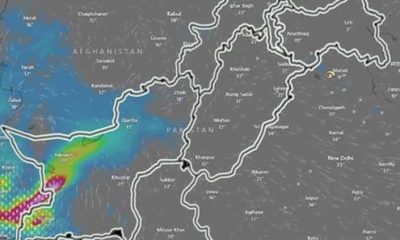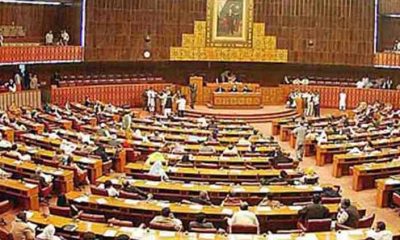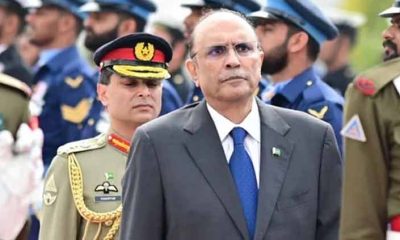The Supreme Court of Pakistan has resumed hearing on a petition filed by the Election Commission of Pakistan (ECP) seeking review of April 4’s ruling regarding holding of elections in Punjab on May 14.
A three-member bench headed by Chief Justice Umar Ata Bandial and comprising Justice Munib Akhtar and Justice Ijazul Ahsan is hearing the case.
ECP lawyer Sajeel Swati is expected to submit arguments on the maintainability of the petition as he was directed by the top judge during yesterday’s hearing to present arguments regarding the “actual case”.
At the outset of the hearing, the chief justice asked: “What is your main point in the case?” He said the court had already wasted time in discussion on an Indian court’s ruling.
Beginning his arguments, the ECP lawyer said Supreme Court rules could not reduce the Constitutional authority.
At which, Justice Ahsan inquired how the rules undermined the Constitutional authority. At which, Mr Swati said the top court in various cases had declared that the scope of the review could not be limited.
Justice Akhtar remarked that the rules of the Supreme Court will become ineffective if the ECP lawyer’s logic is accepted. “You have broadened the scope than the central case,” he added. Sometimes the power of parliament to legislate was also limited, he said.
Mr Swati said a larger bench in a contempt case had declared that the authority of the apex court could not be reduced. He added that the review petition was continuation of the main case regarding elections in Punjab.
At which, the CJP intervened and asked the ECP counsel to be precise in their arguments so the court could get what he wanted to say.
Mr Swati said existence of the caretaker setup was must for holding elections, adding that the Constitution provided procedure for appointment of interim governments. He said the family members of interim rulers could not take part in elections. “The ban has been imposed to ensure transparency in the polls,” the ECP lawyer said.
“If the provincial assembly is dissolved in six months, the caretaker setup will continue for four and half years. Whether there will be waited for four years for the dissolution of the National Assembly?” Justice Ahsan questioned.
Mr Swati replied in affirmative saying the interim government will run the affairs for four and half years in the province. He said an article of the Constitution could not be violated while implementing the other. He argued that delay in 90 days period for election could get legal support from Article 245, saying compensation for delay in election was possible under the constitution.
At which, the chief justice remarked compensation could also be made by electing new government for remaining period. “How it is possible in the Constitution that an elected government serves for six months and interim setup serves for four and half years,” he observed.
The CJP remarked that negative powers got active in the country when elections are delayed. “How long the democracy will be sacrificed by postponing the polls,” he said.
Justice Ijazul Ahsan remarked the 90 day period for holding election had been given in the Constitution, adding that the interim setup was appointed to hold polls. “Extension in interim government’s term is violation of the Constitution,” Justice remarked.
During yesterday’s hearing, CJP Bandial remarked that the use Article 184/3 of the Constitution had increased, saying he had realised that it could also lead to mistake.
At the outset of the hearing, Attorney General for Pakistan Mansoor Usman Awan came to the podium to share his view on some remarks of the bench made during yesterday’s (Tuesday) hearing.
The AGP said the court had asked why the Election Commission of Pakistan (ECP) failed to raise certain points earlier. He also mentioned the top court’s remarks regarding the government being stuck to his stance about the 3-4 majority order.
He asserted that he had also submitted his argument that elections in one province would affect the polls in the National Assembly, adding that the government had also mentioned the majority judgement in its response.
The top judge told the AGP that he did not need to worry as the court was here to listen to him. He added that if any important point was raised, the court would review it and take a decision in this regard.
Referring to yesterday’s arguments related to the jurisdiction of review, he assured that the court would not use the post against the government. CJP Bandial said they were sitting here just for the work of God alone.
Speaking about claims that the SC had provided PTI Chairman Imran Khan with a Mercedes for his appearance before the court on May 11, the chief justice declared the reports false, saying he did not use this vehicle.
The chief justice also asked the AGP to ask his colleagues to avoid using harsh words in parliament.
Subsequently, ECP lawyer Sajeel Swati resumed his arguments. He highlighted that the apex court always interpreted the Constitution as a “living document”. He said the Supreme Court was the ultimate forum of justice therefore, the scope of review could not be limited.
In response, the CJP asked as per the 150 years of judicial precedents, there was a difference between the scope of review and appeal. He lamented that the ECP lawyer did not reply to this question yesterday (Tuesday).
At one point, Justice Akhtar remarked that the rules of the top court would become ineffective if the ECP’s arguments regarding the jurisdiction of a review and appeal were accepted. He said expanding the scope would reopen cases dating back several years.
In reply, Mr Swati said the time for filing a review should not be limited. Justice Akhtar said it was the first time in 70 years that this point had been raised, asking him to give a solution. The ECP lawyer said the constitutional provision of reviewing rules could not be interrupted.
Adding to the point, Justice Ahsan said the scope of the review was clearly mentioned in the rules of the apex court.
At one point, CJP Bandial observed that the use of Article 184(3) had increased. “We have realised that this can lead to mistakes.”
Later, the chief justice asked the ECP lawyer to submit arguments on the actual case and adjourned the hearing till Thursday.
The top court on April 4, had ordered to hold Punjab provincial assembly election on May 14. It had also directed the federal government to provide Rs21 billion for the elections in Punjab and Khyber Pakhtunkhwa by April 10 and make available all the necessary personnel, whether from the Armed Forces, Rangers, or the Frontier Constabulary for the security and other purposes related to the general elections.
The court also ordered the electoral watchdog to present a report on the provision of funds on April 11. It came as Imran Khan-led party had filed the petition regarding delay in elections after the ECP on March 22 put off the polls till Oct 8, citing financial and security constraints.
Later, the federal government, in response, took the matter to the parliament to get the funding approved. Finance Minister Ishaq Dar presented the election expenses bill in the National Assembly.
The ECP, on April 11, apprised the SC in a report that the government had not provided funds to the commission for holding elections in Punjab.
According to the Election Commission, the government had not yet provided Rs21bn despite the SC’s order and the Punjab caretaker government had agreed to provide only 75,000 personnel for security. “There is a shortage of 300,000 security personnel for the elections in Punjab,” the ECP noted.
Upon this, the court issued notices to top officials including Attorney General Mansoor Awan, State Bank of Pakistan (SBP) Governor Jameel Ahmad, Secretary of the Finance Department, and Secretary of the Election Commission of Pakistan (ECP) over failing to provide funds for upcoming Punjab elections.
Later, the PTI and the PDM-led government sat on the negotiating table, starting on April 27, to talk through elections but it culminated in consensus on holding elections simultaneously across the country with an impasse on the date during its third and last round on May 2.
On May 3, the ECP approached the court seeking review of its order to hold polls on May 14. Three days later, CJP Bandial said the apex court would proceed in line with the constitution and would not sit idle on the May 14 election issue if the dialogue between the government and the PTI failed.
Post Views: 69

 Fashion3 months ago
Fashion3 months ago
 Fashion3 months ago
Fashion3 months ago
 Sports2 months ago
Sports2 months ago
 Sports2 months ago
Sports2 months ago
 Fashion2 months ago
Fashion2 months ago
 pakistan2 months ago
pakistan2 months ago
 World3 months ago
World3 months ago























